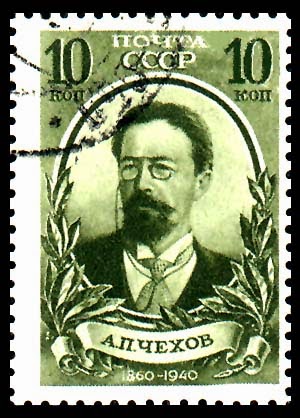LiteraryJoint is
proud to present the full text edition of "The Chorus Girl and other
stories," a collection of short stories by Anton Pavlovich Chekhov, many
of them not yet very well known by the general public. Every month, we
will commit one of our weekly post to these stories, in their English
translation by Constance Garnett. After
My Life, On the Road, The Chorus Girl, Verotchka, and At a Country House, we now continue with "A
Father," which will be followed by: Rothschild's Fiddle, Ivan
Matveyitch,
Zinotchka, Bad
Weather, A
Gentleman Friend, and A
Trivial Incident.
 |
| USSR - A Stamp celebrating Anton Chekhov |
"I ADMIT I have had a drop. . . . You must excuse me. I went into a
beer shop on the way here, and as it was so hot I had a couple of
bottles. It's hot, my boy."
Old Musatov took a nondescript rag out of his pocket and wiped his shaven, battered face with it.
"I have come only for a minute, Borenka, my angel," he went on, not
looking at his son, "about something very important. Excuse me, perhaps I
am hindering you. Haven't you ten roubles, my dear, you could let me
have till Tuesday? You see, I ought to have paid for my lodging
yesterday, and money, you see! . . . None! Not to save my life!"
Young Musatov went out without a word, and began whispering the other
side of the door with the landlady of the summer villa and his
colleagues who had taken the villa with him. Three minutes later he came
back, and without a word gave his father a ten-rouble note. The latter
thrust it carelessly into his pocket without looking at it, and said:
"
Merci. Well, how are you getting on? It's a long time since we met."
"Yes, a long time, not since Easter."
"Half a dozen times I have been meaning to come to you, but I've
never had time. First one thing, then another. . . . It's simply awful! I
am talking nonsense though. . . . All that's nonsense. Don't you
believe me, Borenka. I said I would pay you back the ten roubles on
Tuesday, don't believe that either. Don't believe a word I say. I have
nothing to do at all, it's simply laziness, drunkenness, and I am
ashamed to be seen in such clothes in the street. You must excuse me,
Borenka. Here I have sent the girl to you three times for money and
written you piteous letters. Thanks for the money, but don't believe the
letters; I was telling fibs. I am ashamed to rob you, my angel; I know
that you can scarcely make both ends meet yourself, and feed on locusts,
but my impudence is too much for me. I am such a specimen of
impudence—fit for a show! . . . You must excuse me, Borenka. I tell you
the truth, because I can't see your angel face without emotion."
A minute passed in silence. The old man heaved a deep sigh and said:
"You might treat me to a glass of beer perhaps."
His son went out without a word, and again there was a sound of
whispering the other side of the door. When a little later the beer was
brought in, the old man seemed to revive at the sight of the bottles and
abruptly changed his tone.
"I was at the races the other day, my boy," he began telling him,
assuming a scared expression. "We were a party of three, and we pooled
three roubles on Frisky. And, thanks to that Frisky, we got thirty-two
roubles each for our rouble. I can't get on without the races, my boy.
It's a gentlemanly diversion. My virago always gives me a dressing over
the races, but I go. I love it, and that's all about it."
Boris, a fair-haired young man with a melancholy immobile face, was
walking slowly up and down, listening in silence. When the old man
stopped to clear his throat, he went up to him and said:
"I bought myself a pair of boots the other day, father, which turn
out to be too tight for me. Won't you take them? I'll let you have them
cheap."
"If you like," said the old man with a grimace, "only for the price you gave for them, without any cheapening."
"Very well, I'll let you have them on credit."
The son groped under the bed and produced the new boots. The father
took off his clumsy, rusty, evidently second-hand boots and began trying
on the new ones.



